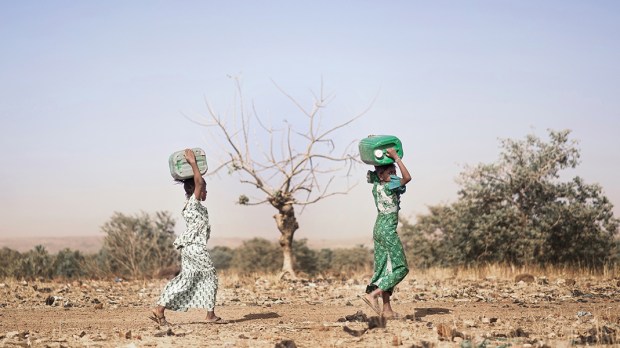Massive disruptions in the economy due to the COVID-19 pandemic are leading to the threat of starvation for millions of people around the world.
In some nations, civil unrest and natural phenomena are already impinging on people’s ability to grow and harvest food. The pandemic and the lockdowns needed to contain it are making the situation even worse.
“The pandemic is a crisis on top of a crisis in parts of Africa, Latin America and Asia,” said Sean Callahan, president and CEO of Catholic Relief Services, the foreign aid and development agency sponsored by the bishops of the United States. “The severe health risks are only part of the coronavirus outbreak. Lockdowns are hampering people from planting and harvesting crops, working as day laborers and selling products, among other problems. That means less income for desperately hungry people to buy food, and less food available at higher prices.”
Pope Francis also addressed the issue on Thursday, during morning Mass.
“In many places, one of the effects of this pandemic is that many families find themselves in need, and they are hungry,” the pope said. Many families are not working and do not have food to put on the table for their children, he said.
On top of the 135 million people already facing acute food shortages, another 130 million could go hungry in 2020, Arif Husain, chief economist at the World Food Program, a United Nations agency, told the New York Times. That means an estimated 265 million people could be pushed to the brink of starvation by the end of the year.
“This hunger crisis, experts say, is global and caused by a multitude of factors linked to the coronavirus pandemic and the ensuing interruption of the economic order: the sudden loss in income for countless millions who were already living hand-to-mouth; the collapse in oil prices; widespread shortages of hard currency from tourism drying up; overseas workers not having earnings to send home; and ongoing problems like climate change, violence, population dislocations and humanitarian disasters,” the Times explained.
An overview of the situation reveals some worrying trends:
East Africa: CRS reported that desert locust swarms have exploded as a result of heavy rainfall and cyclones likely linked to climate change. Crop damage already is extensive, and numbers of locusts could increase at least 20 times by June and spread to many countries. As many as 35 million people face severe hunger in the region. The problems are being compounded by the coronavirus response. Flight restrictions have delayed deliveries of pesticides. At the current rate of spraying, stocks in Kenya will soon run out.
In Nairobi, Malteser International, which is sponsored by the Order of Malta, is preparing to respond to the massive locust infestation. “Vast swarms of desert locusts, some of which cover an area of almost 250 square kilometers, are devouring crops in northern Kenya,” Malteser said. “According to the UN Food and Agricultural Organization (FAO), the locust invasion is the biggest in Kenya in over 70 years.”
“The impact of the infestation on food security and livelihood of the rural population in the region is of great concern to us,” said Martin Schömburg, Malteser International’s Country Coordinator in Kenya. “The communities we work with in Marsabit district are directly affected and our priority at present is to help compensate for their losses and enable them recover from this crisis.”
West Africa: Intense urbanization, climate change, poverty and conflict are causing widespread food insecurity. CRS said that this is the lean season when food from the annual harvest has run out for many people. Even without coronavirus, about 17 million people in West and Central Africa are predicted to be in a crisis situation for food by June and August. Coronavirus could kill or further weaken many of them.
Central America: Nearly one million small farmers have endured consecutive seasons of drought which have destroyed corn and bean harvests and left little in the way of reserves. Many farmers surveyed by CRS in March said they had only enough food to feed their families for a month. Coronavirus restrictions make matters worse. This is the planting season, but many farmers are hesitant to plant for fear of contracting the virus, or of being detained by police. Reduced planting would be disastrous for the already food insecure region.
“What little money families can scrape together, they will likely use to buy food instead of seeds and fertilizer for the upcoming planting season, putting the next harvest at risk,” said Blain Cerney, head of program for CRS in El Salvador.
Meanwhile, rice and wheat prices are surging.
Worldwide school closures are also increasing food insecurity. About 1.5 billion children are currently out of school globally due to coronavirus restrictions, the United Nations Educational, Scientific and Cultural Organization (UNESCO) reports. But millions of children in developing countries receive their only meal of the day at school through food distribution programs such as the U.S. government’s McGovern-Dole program.
In East Africa, CRS is pursing emergency funding to support pesticide spraying, surveillance of locust swarms, distribution of new seeds and animal feed and other support. This effort will integrate measures to help people avoid the coronavirus. CRS is working to continue its meal program for school children in nine countries, despite disruptions. In Ethiopia, the organization and its partners have been able to continue feeding 1.5 million people emergency food rations, taking added precautions to protect staff and local people from virus exposure.
But funding is short for this critical response, the agency pointed out. The FAO has secured about $114 million to fight the locust swarms in East Africa, but that is close to $40 million less than needed. CRS and other humanitarian organizations are calling on Congress to increase funds for coronavirus-related activities overseas, and the impacts of the pandemic. A fourth stimulus bill now being considered in Washington would be the perfect vehicle for this aid, CRS said.

